Jan 13, 2026 2:09 PM
More Trump-Kennedy Center Cancellations
The fallout from the renaming of the John F. Kennedy Center for the Performing Arts to include President Donald…
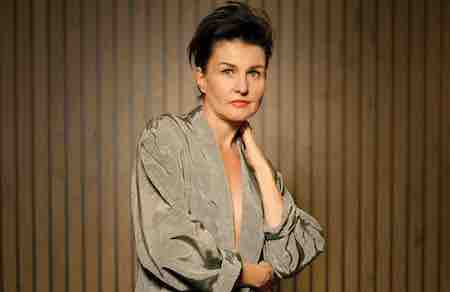
Harpist Alina Bzhezhinska, one of 15 European artists DownBeat critics selected as must-hear music.
(Photo: Eddie Otchere)Many of us at DownBeat have found ourselves stuck at home lately, wondering what’s happening elsewhere — especially across the pond in Europe. So we asked five of our European writers to do a simple assignment: Select three European acts that deserve our attention. On the following pages, they highlight 15 groups and artists that exemplify the breadth and beauty of Europe’s improvised music scene. The most surprising aspect of this assignment? No writers duplicated a single selection, and each expressed grief about choosing between favorite artists. Perhaps we’ll need another round. Enjoy.
‘I speak four or five languages, but my main language is music’
“I try to present my instrument with a strong voice. My goal is to show people that the harp can be a leading instrument,” said London-based harpist Alina Bzhezhinska. “All my life, I’ve been fighting the stereotypes that come with playing the harp. As a teeanger, I wore a leather jacket, cut my hair off and was in a rock band,” she laughed.
Set for release in the autumn is Reflections, a combination of original tracks and covers that will be released by BBE Records. It opens with a soaring and funky take on Dorothy Ashby’s “Soul Vibrations.”
“Dorothy Ashby has been my hero for a very long time,” Bzhezhinska said. “She was an activist. She had radio programs supporting Black musicians. And she was an educator. She was the woman that I always wanted to be. When I made my album, I knew I wanted to do this special tribute.”
Does Bzhezhinska feel like a member of the European jazz scene? Not quite. “You know, when I played music as a child, I never wanted to be a musician from the Soviet Union. I wanted to go away from boxes. With my studies, I’ve traveled around the world — America, Germany, Poland and now I’m here in Britain. After I traveled, I realized that I’m a person of the world. I speak four or five languages, but my main language is music.”
Bzhezhinska’s excitement for the release of Reflections is being juggled with devastation. She spoke to DownBeat days before taking relief items to her war-torn home, the Ukraine. Bzhezhinska hoped to see her family who live in Lviv — if only for a moment.
“For two years of the pandemic I was holding onto this album, and finally I signed with BBE. It was one of the best things that has happened to me musically. Now, I feel almost guilty to openly celebrate my musical success because there are people who suffer and who simply need food or shelter,” she said.
Bzhezhinska reflected on a recent phone call where she told her mom that she wants to go home to Lviv. “Music is your weapon,” she said, recounting her mother’s advice. “You need to be on stage and tell people about Ukraine.We need people to understand who Ukrainians are.” —Tina Edwards
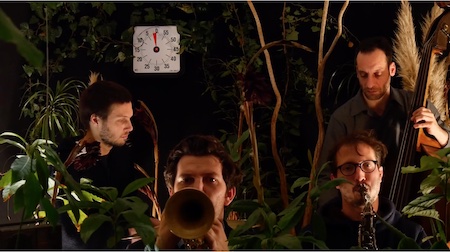
Creating a toolbox for improvisation
The members of this French-Italian-German quartet came together in 2011, but they’ve also performed in plenty of other contexts. The intuitive rapport between the member’s Die Hochstapler (German for the Impostors) — trumpeter Louis Laurain, bassist Antonio Borghini, drummer Hannes Lingens and alto saxophonist Pierre Borrel — seemed in place from the very start. The quartet’s strength resides in its quicksilver improvisational instincts, collectively responding to on-the-fly cues to accept or reject new material from its repertoire in real time.
On the group’s first album, The Braxtornette Project (released, as all of their recordings are, on the Umlaut imprint), they toggled endlessly between material composed by Ornette Coleman and Anthony Braxton, drawing unexpected connections as they swapped themes and revisited licks, shuffling the internalized material like a deck of cards.
For the group’s second album, Die Hochstapler Plays The Music Of Alvin P. Buckley (2016), the members turned the writings of Chicago linguist Alvin P. Buckley into loose-limbed compositional gambits, bringing his sketches for game pieces and collective composing to razor’s edge fruition, building further on sublime internal trust.
This fall, the quartet will simultaneously release two new albums, pulling back the curtain on its modus operandi. They refer to Beauty Lies as a toolbox, a collection of 25 short tunes, licks and fragments that they’ve written and memorized. The second album, Within, documents what the band does with those materials over the course of two live sets recorded in February of this year, forging an unceasing stream of bracing free-bop negotiations, unfettered swing, pungent solos and collective surprises.
Few working bands have been able to find so much vitality and invention in the building blocks of improvisation. —Peter Margasak
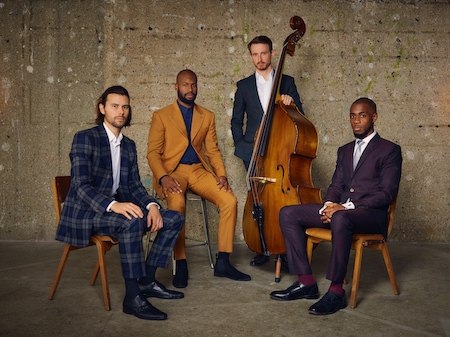
Having a dialogue with history
Empiricism was the first great British contribution to philosophy, and now the group Empirical, around for an astonishing 15 years already, is one of the great British contributions to European jazz.
Those two words together in a sentence now inevitably involve a third, uglier coinage. Empirical vibraphonist Lewis Wright said, “Unfortunately, I think we are going to be seeing a significant amount of long-term fallout from Brexit in our industry, especially for artists who aren’t stadium-filling pop stars.”
Wright happened to be the spokesman on this occasion, but Empirical is that other proud British invention (maybe), a democracy, with saxophonist Nathaniel Facey, drummer Shaney Forbes and bassist Tom Farmer all sharing responsibility for the group’s evolution. Brexit made it harder to tour, and then COVID-19 made it impossible. The fan base, while not stadium-scaled, is nonetheless large and loyal, and the group’s intelligent, polystylistic approach keeps audiences alert. Wright and his compeers are hopeful despite the “gloomy undertones.” They seem united in a conviction that European versus American jazz is too blunt a distinction to be meaningful.
And yet, jazz’s birthplace retains its tutelary force. “America is the birthplace of jazz, and there are direct links there to its development in the form of individual musicians,” Wright said. “The kind of interactions between younger musicians and the older musicians who helped shape the language can often foster a deeper connection and responsibility that the younger musicians take on as the next generation of architects.” Empirical is very much engaged in what he calls a “dialogue with history,” sometimes through living musicians they’ve met, sometimes through the rich, recorded legacy.
He thinks that the seriousness of study within the group contributes to its uniqueness, one forged on four distinct creative identities. —Brian Morton
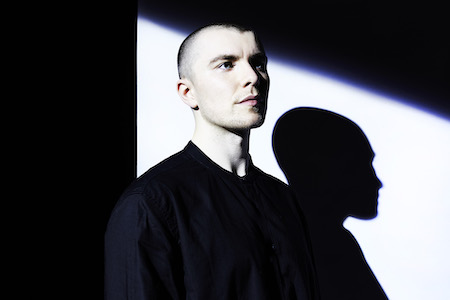
At the center of Glasgow’s eclectic scene
Glasgow’s jazz scene is becoming increasingly enviable with its penchant — much like London — for dissolving the notion of genre. At its epicenter is drummer and composer Graham Costello with his band, STRATA — not to be confused with Gilles Peterson and Jean-Paul “Bluey” Maunick’s STR4TA.
Costello’s music traverses extremes, never staying in one mood for long. Ambient minimalism, free jazz and noise-rock tools are on the map with cinematic results.
Formed in 2016, STRATA features Liam Shortall (trombone), Harry Weir (tenor sax), Fergus McCreadie (piano), Kevin Cahill (guitar) and Gus Stirrat (electric bass) with Costello on drums — a who’s who of Glaswegian jazz talent.
The most recent album, Second Lives, is alive and kicking with dynamism. “Legion” roars with a percussive opening, building a sense of foreboding tension thanks to Weir’s staccato saxophone. Meanwhile, “Iris” hums mournfully, with McCreadie on keys and no drums from Costello in sight; the sign of a rounded bandleader who can lead silently.
Unlike Scotland’s capital of Edinburgh, where the jazz scene celebrates tradition, Glaswegian jazz musicians like Costello are drawing on the city’s deep-rooted culture in electronic music. For further research into the scene, dive into DJ and producer Rebecca Vasmant 2021’s album With Love, From Glasgow (Rebecca’s Records).
STRATA maintains DIY ethos, but that hasn’t held the group back; Costello has been nominated for Scottish Album of the Year, as well as eight Scottish Jazz Awards. He’s part of the reason Glasgow’s jazz scene has never been healthier. —Tina Edwards
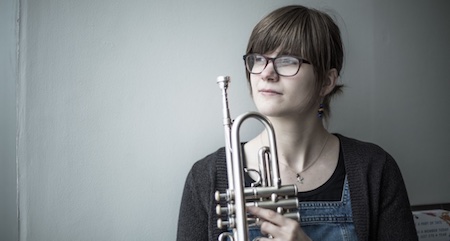
An impossibly accomplished new mother
British trumpeter Laura Jurd has just had a baby. Without wanting to seem indelicate, one wonders how she found the time. One of the busiest and most respected improvisers and composers on the British scene, the Hampshire-born musician has led the Mercury Prize-nominated band Dinosaur, the more elusive Blue-Eyed Hawk, collaborated with the London Sinfonietta, the Ligeti Quartet, and the Chaos Orchestra, and released three acclaimed albums under her own name — from Landing Ground in 2012 to Stepping Back, Jumping In in 2020, just as COVID stepped in and spoiled the party. Perhaps, that’s how she found the time.
Jurd had claimed influences as wide apart (or not) as the Beatles and Stravinsky and writes music that seems impossibly accomplished for so young a performer. Her sense of form and structure is admirable. Every piece seems to have its own logic and sense of direction, but with no predictability or easy resolution. They both echo and subtly differ from a familiar British instinct for the pastoral. It’s there, but never dominant, while the clarity of her brass playing, reminiscent, perhaps, of Kenny Wheeler, cuts through. A synthesizer is called on when she needs other textures and colors.
As an improviser, she seems open-eared and highly responsive to those around her, making her an ideal bandmate and collaborator. The list of those she’s worked with, already impressive, will now just get longer, diapers permitting. Understandably, she wasn’t free to talk to DB. —Brian Morton
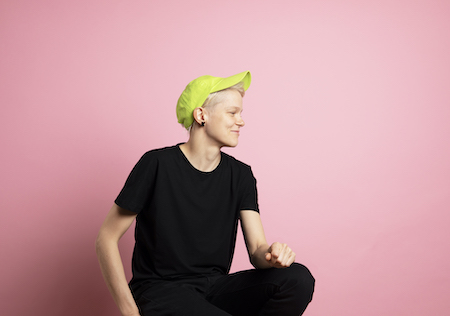
Finding a deeply personal approach to improv
Finland’s jazz scene has become a small but persistently intriguing outpost of European improvised music over the past decade. Coalescing around the label We Jazz, acts such as tenor saxophonist Timo Lassy, quintet Komo Saxo and drummer Teppo Mäkynen have carved out a niche for deep-swinging, collective improvisation that trades off of sparse minimalism as much as it does the bombast of group melody.
Helsinki-based composer and saxophonist Linda Fredriksson is a stalwart of the Finnish contemporary scene, playing variously as a member of the trio Mopo and experimental group Superposition. In 2019, Fredriksson released a debut album as a bandleader, Juniper, on We Jazz, setting course as one of the most exciting and propulsive acts from the city. Referencing the indie introspection of Sufjan Stevens as much as the keening, complex melodies of Eric Dolphy and Pharoah Sanders, Fredriksson’s emotive tone produces a sound that lives within the grey spaces of liminality.
Throughout Fredriksson’s work, field recordings of rural surroundings intersect with the lo-fi hiss of demo tapes, while Fredriksson’s sax sings like speech desperate to be spoken. On “Neon Light (and the Sky Was Trans),” for instance, saxophone lines build from a tentative melodic suggestion to forceful waves unable to be contained, reflecting the fraught nature of self-expression, while the tribute to a late grandmother, “Nana–Tepalle,” crescendos from a plaintive refrain to a multi-layered cacophony — mirroring the tumult of bereavement.
Fredriksson’s body of work ultimately exists to pull the listener into a complex confessional. It is a deeply personal, self-searching approach to improvisation. —Ammar Kalia
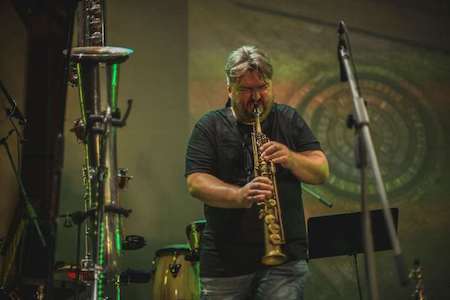
Fierce multi-instrumentalism from Lithuania
The Lithuanian reedsman Liudas Mockūnas has made a startling impact in the improvised music zone, with a background in jazz, as well as a growing reputation as a modern classical interpreter, and sometime composer. He plays a range of saxophones, from sopranino to bass, as well as a clutch of clarinets. Lately he’s been experimenting with water-filled horns. Mockūnas has strong connections in Copenhagen, where he studied, but has also been touring internationally for the last two decades.
Mockūnas often chooses to play in small formations, either duos or trios, and has recorded with Barry Guy, Marc Ducret and Stefan Pasborg. The exceptional Purvs album was released in 2021 by the Riga-based Jersika Records, which specializes in analog, reel-to-reel sessions, and only issues vinyl. Jeriska took its equipment to a peat bog for the Purvs sessions, where Mockūnas teamed up with fellow saxophonist Arvydas Kazlauskas.
“It was very special indeed,” Mockūnas recalled. “Recording outdoors, in the wild nature, is already special. Some of the music was recorded at night, hearing the wind, trees, and birds. Another part during the day, the wild atmosphere interrupted by tractors and trucks working on the fields. The third part was a live concert played on the makeshift peat ampitheater, with an audience. All of that created a very different musical energy, but united by the very special acoustics of nature.”
That same duo played a notably powerful set at the July 2021 edition of Rigas Ritmi, the prime jazz festival in Latvia. They moved from extreme depths to trilling heights, often sounding structured, as if improvisation was taking place around agreed patterns. Mockūnas switched from baritone to soprano, and ultimately ended up with two horns in his mouth, issuing a doubled fanfare, before standing in front of his towering bass saxophone, and delivering a final aural retort. The duo consistently emitted a fierce odor of tension. —Martin Longley

A Radically Open Approach
Since 2016, Polish label Astigmatic Records has been releasing music that takes a radically open approach to jazz. Artists such as Bloto combines fragments of jazz arrangements with the thundering bass of trap and drill, while Pakistani group Jaubi blends North Indian classical music with hip-hop and modal jazz, and the EABS septet pieces together pre-made hip-hop deconstructions of jazz and funk, in a new guise.
Present throughout these fascinating releases is the enduring hand of pianist Marek Pędziwiatr.
Always a subtle inclusion, on Jaubi’s album Nafs At Peace, it is Pędziwiatr’s synth work that lifts the group’s classical compositions into an experimental space, adding new, metallic textures to an ancient, acoustic sound. On EABS’s output, meanwhile, his melodic right hand anchors the mercurial nature of its thumping rhythm section. And amongst the low-end foundations of Bloto, Pędziwiatr provides a tripping lightness with his voicings.
On his debut album as a bandleader – using the new moniker Latarnik – Pędziwiatr truly shines, unadorned. Released in 2022, Marianna takes a far more personal approach in its composition and allows Pędziwiatr the space to explore his musicality on his own terms. Inspired by the life of his great-grandmother and recorded using a 100-year-old Steinway on analog tape, the result is a beautifully rich collection that traverses the solo piano experimentalism of Nils Frahm as much as the heartfelt melodic expression of Abdullah Ibrahim.
Doing away with the bluster of contemporary fusion, Pędziwiatr is instead left to roam through his own emotive improvisations. It is an expressive sound honed through a career spent collaborating in alternative genres and ultimately finding a home in the warmth of piano jazz. —Ammar Kalia
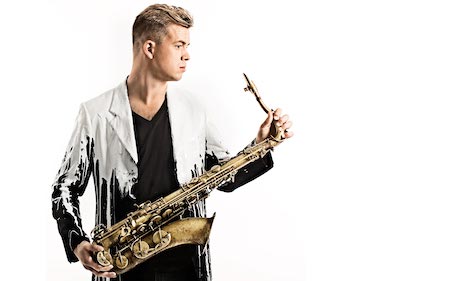
The present of European jazz
They say that in British politics you’re either European or Atlanticist, and that kind of divide can also be applied to music. There was a time when European players insisted that imitating American stars was an infantile phase of development, long since left behind.
Some of the younger generation take a more inflected view. Among the most ambitious players under 40 is saxophonist Marius Neset, who started out at the Copenhagen Rhythmic Music Conservatory (albeit he’s Norwegian). He was mentored and apprenticed by Django Bates, and in 2016 found himself in DB’s “25 for the Future.” Since then, he’s made four albums with the ACT label, including the 2020 Tributes with the Danish Radio Big Band. Though now well-established, he’s still happy to talk about influences.
“I grew up listening to the great masters in jazz … and that’s still important, but I feel the musical world is more universal, probably because of the internet,” he said. “It’s harder to separate the genres now.”
Neset won’t be pressed on whether this eclecticism is more evident in Europe than Stateside. “Myself, I am much influenced by European classical composers, and I try to bring some of this influence in my own music.”
Neset is a master of form. His music is poised and logical without being passionless, still with jazz’s core values. “It’s about which story you want to tell, and I think I’ve learned a lot from classical music when it comes to this,” he said.
The pandemic for Neset was a strain. “It feels wonderful that things are getting back to normal again,” he said. “I’m working on a new album with a new band that I’m very proud of. I’m also composing a new project with [the adventurous classical ensemble] London Sinfonietta.”
Also important to his development is an association with bass legend Arild Andersen, “a freer and more open approach to music than I’m used to, but I love to experiment with that side as well.”
He’s not the future of European jazz. He is the present. —Brian Morton
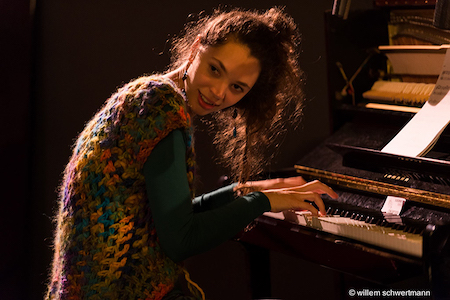
Creating unusual timbers and beguiling constructions
Since moving to Amsterdam in 2014, the young Polish pianist Marta Warelis has gradually emerged as one of the most versatile, daring and skilled musicians in European improvised music.
Last June, she finally released a debut album under her own name, a stimulating solo recording titled a grain of Earth (Relative Pitch). But in recent years, she’s increasingly operated within a growing number of collective projects where she deftly adapts, alters and expands her full diapason according to the needs of a given band.
In the trio Hupata!, which released a terrific 2020 album for Astral Spirits titled Microclimates, she toggles between pointillistic explosions, post-Cecil Taylor clusters and spidery, rhythmically complex lines in response to and provocation for reedist Ada Rave and percussionist Yung-Tuan Ku. She’s thrived in a group of other improv settings, matching the chamber-like delicacy of the long-running duo of reedist Ab Baars and violinist Ig Henneman with jagged feints, post-classical counterpoint, and sudden outpouring of lyric splendor, while in a quartet with drummer Frank Rosaly, saxophonist John Dikeman and bassist Aaron Lumley, she toggles between free jazz extroversion and harmonically ambiguous exploration.
More recently trumpeter Dave Douglas recognized her talents, including her in the centuries-spanning aesthetic of his Secular Psalms project. But her finest collaborative endeavor is the trio called Omawi with bassist Wilbert de Joode and drummer Onno Govaert, where her melodic fluency and rich technical vocabulary dazzle. That group will release a new album for Relative Pitch in 2023, so until then we can bask on her prepared piano experiments, engagement with abraded textures and unusual timbres and beguiling melodic constructions that emanate from the super new solo effort. —Peter Margasak
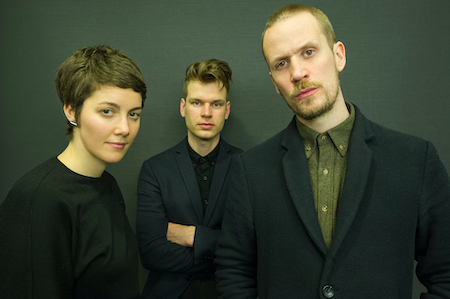
An all-star side project
Copenhagen-based Slovenian pianist Kaja Draksler leads a fantastic octet that sets poetry to art songs spiked by edgy improvisation, and she has developed a heavily composed solo-practice rife with microtonal effects. Berlin-based, Swedish bassist Peter Eldh is a triple threat: a top-notch groove machine, composer and producer — that rare breed who’s equally adept in post-bop and hip-hop, a quality he’s brought to his shape-shifting quintet Koma Saxo and in his studio-driven, funked-up Projekt Drums endeavor. German drummer Christian Lillinger has applied his multifarious beat dissections in many contexts, including his sometimes cerebral, sometimes extroverted trio with vibraphonist Christopher Dell and bassist Jonas Westergaard, and his confab of doubled and tripled instrumentalists called Open Form for Society. They’re among the busiest figures in improvised music today.
That makes their commitment to Punkt.Vrt.Plastik almost as remarkable as the music they generate. The trio’s first-ever gig came when ex-Bimhuis artistic director Huub van Riel assembled the group for October Meeting, his three-day improv extravaganza in 2016. Both the audience and musicians seemed to realize they had experienced something special.
Earlier this year, the group released Zurich Concert (Intakt), a jaw-dropping live set. All three musicians write for the group, placing an emphasis on rhythmic acrobatics. The trio has internalized its repertoire, so even when they employ a set list, the musicians are free to divert from the path, spontaneously introducing a melody or pattern from another tune in the middle of essaying an entirely different composition. Sometimes they defer to the interloper, and sometimes they’ll reject the suggestion, bulldozing on and forcing the outlier to get back in line.
One of the most exciting developments has been Draksler’s ingenious use of microtonal effects. Adapting a computer set-up that U.S. pianist Cory Smythe developed in duo projects with fellow pianist Craig Taborn — and employed on his own 2020 vocal-driven album Accelerate Every Voice (Pryoclastic) — Draksler unleashes improvisational lines and riffs that explode in hall-of-mirrors harmonies.
The keyboard platform, programmed by Gianluca Elia, was effectively deployed by Draksler on her recent solo recording In Otherness Oneself (Unsounds).
Ultimately, Punkt.Vrt.Plastik is a three-headed beast of equal engagement, with each musician pushing within high-level conversation. When all three players balance a desire to rip apart those frameworks, they become utterly magnetic in spite of mystery. —Peter Margasak
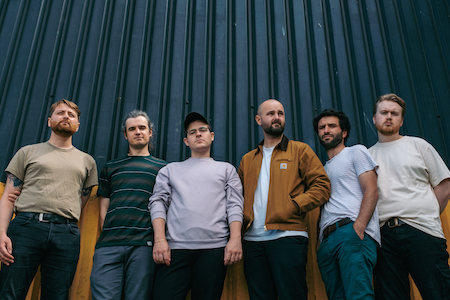
‘We’ve always been super-accepted in Europe’
Northern-Irish outfit Robocobra Quartet straddles jazz, punk and experimental music — which may evoke a daring and jazz-ish take on The Pixies.
Vocalist, drummer and producer Chris Ryan is a charismatic frontman leading from the back. His creative storytelling is delivered with dry, satirical flair. The group uses Quartet in its name, but the personnel fluctuates between four and 12 musicians. It’s six who make the line-up for the band’s forthcoming third album, Living Isn’t Easy, which will be released through London-based label First Taste Records.
The lead single “Heaven” is about the “cult-like mania of capitalism,” said Ryan. “I grew up listening to Dead Kennedys and always liked how they would write songs from the perspective of a character they didn’t necessarily agree with. I wanted to get inside that chaotic, self-absorbed headspace of a corporate cult leader.”
The band has a loyal following across the continent. “To be honest, we feel closer to Europe than we do with the U.K.,” said Ryan. “We’ve always been super-accepted in Europe. We’ve played 12 Points Festival, Bimhuis in Amsterdam, Montreux Jazz. European jazz festivals are open to having experimental sounds.”
Robocobra Quartet refuses to keep to a predictable path. Each of its three albums sits at varying degrees of texture and size. “One of the things we do best is play live. With Living Isn’t Easy, the plan was to write it all together instead of me coming down from the pulpit with sheet music. It’s more focused than any of our other stuff.” —Tina Edwards
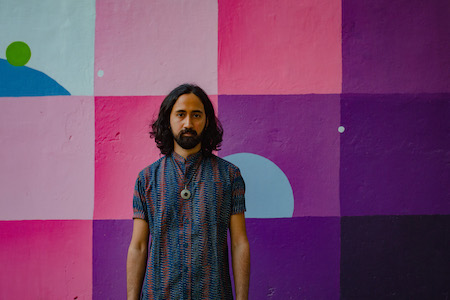
Finding the openness of improvisation
Much has been made of the London jazz scene over the past five years. A product of the city’s racially diverse makeup, a new generation of artists has honed its skills through accessible, free grassroots workshops, resulting in sounds that interpolate the sonic traditions of their diasporic heritages with the methods of improvised music. Bandleaders such as Shabaka Hutchings, Nubya Garcia and drummer Moses Boyd have led the charge, with their work that combines Afrobeat with Caribbean and West African melody, frenetic electronics and jazz improvisation.
In and among this youthful mix is drummer and composer Sarathy Korwar. Born in the U.S. and raised in India, Korwar landed in London in 2009. While not being brought up in the English capital, his output has exemplified a genre-splicing, multi-ethnic identity.
“When I first arrived, I was spending all of my time ’shedding in the practice room,” Korwar said by phone from his London home. “There wasn’t a particular jazz scene forming, instead the biggest influence on me was the fact that I had access to so many of my drumming idols for the first time in my life. I could go to Ronnie Scott’s on the weekend and see someone like Steve Gadd play — it was incredible.”
Korwar internalized these musical influences and applied their virtuosity to his own interests. The result was 2016’s debut album Day To Day. Largely consisting of field recordings he made of the folk music of the Sidi people in rural Gujarat, the album is a beguiling mix of devotional singing and propulsive rhythm that traverses everything from punchy Afrobeat fanfares to modal jazz.
Korwar’s freewheeling approach put him in the same vein of fellow London artists Garcia and Boyd, who were also releasing debut projects in 2016, while his emphasis on pursuing the specificity of his own culture equally set him apart from the London group. “I’ve always felt part of the open, collaborative London scene, but at the same time, I’m often the only South Asian in the room, so I bring my own lived experience of having grown up elsewhere,” he said. “That adds a different flavor to the music.”
This meeting of cultures has been further explored in Korwar’s ensuing releases. 2018’s My East Is Your West is a live recording blending spiritual jazz with Indian classical traditions, while 2019’s More Arriving coalesces around the statement that “there is no singular brown voice,” subsequently blending Hindi hip-hop with jazz, Indian classical and spoken word. “I sometimes see myself as existing outside of any scene, since I don’t want to be boxed into a particular genre,” Korwar said. “I always work with people, rather than just their music. It’s the openness of improvisation that is the driving force.”
Indeed, this open approach is what lends Korwar’s music to the genre-eating, improvised output of the loosely apportioned London scene, while his unique lived experience also sets him apart. Korwar’s music is ineffable; he is within the scene and without — an artist ultimately of his own making. —Ammar Kalia
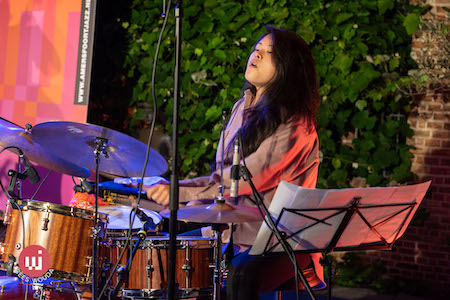
‘Jazz was a more powerful draw’
The South Korean drummer and composer Sun-Mi Hong has been living in Amsterdam for the last 11 years, becoming immersed in its jazz scene. She’s just been signed to the increasingly international Edition Records in the U.K., and the third album by her quintet, Third Page: Resonance, will be released later this year.
During 2021’s Amersfoort festival in the Netherlands, Hong appeared with two outfits, playing with the Israeli guitarist Eran Har Even and with Sojourner’s Truth, led by the flautist Mark Alban Lotz. In the first set, Hong opened with direct hand-tapping on her snare, soon finding a timbale resonance once she picked up her sticks. The second gig found her adventuring into a dub style, leading a briskly stepping, adhesive groove. Hong was one of the most marked revelations of that festival, formally precise, but not at the expense of spontaneous wildness. She picked up an Edison Jazz Award in 2021 for the well-titled A Self-Strewn Portrait and back in 2018 she’d already won the SENA Dutch Jazz Competition.
“I was looking for a label to release my upcoming album, and who might be interested in my music,” she said. “Meanwhile, I got invited to join the Edition Records program called Direction in Music. Dave Stapleton [the label’s founder] and I talked, and a week later he signed me to Edition.”
Hong didn’t plan to become a long-term Dutch resident. “I was in a Conservatory Pop department in Korea, and I just wanted to touch lightly on a bit of jazz in the Netherlands and then come back to Korea. Therefore, I didn’t learn to speak or understand English well. Jazz was a more powerful draw than I imagined, so I stayed.
“Amsterdam’s music scene is beautiful, and blossoming, full of amazing talents arriving from all over the world.”
Hong also leads Dance In Four Colours, combining drums, strings, electronics and choreography. Beyond that, she plays in a duo with trumpeter Alistair Payne, and she also formed a trio in 2021 with the Dutch pianist Harmen Fraanje and the Portuguese alto saxophonist José Soares. —Martin Longley
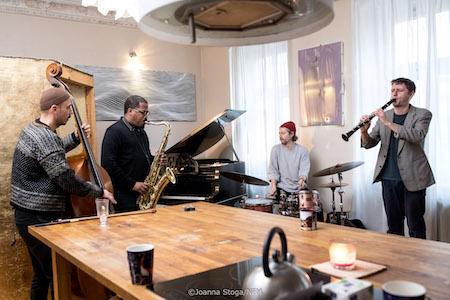
No standards allowed
Sundogs has become a crucial element during the annual scene of Poland’s Jazztopad. These three players run that festival’s nightly improvising session in Mleczarnia, a basement café in Wrocław, inviting visiting artists, as well as musicians from all parts of Poland. No standards are allowed during the sets, as free playing abounds. The setup has produced inspiring sets featuring Brad Mehldau, Shabaka Hutchings, Nicole Mitchell, Amir ElSaffar, Alexander Hawkins and James Brandon Lewis, among many others.
When the trio play without guests they also operate on the finest level of improvisatory resourcefulness. Mateusz Rybicki plays tenor saxophone and various clarinets, while Zbigniew Kozera swaps between upright bass and Moroccan gnawa sintir. This pair of Poles are joined by drummer and percussionist Samuel Hall, an Australian living in Berlin.
Currently shaping its next album, Sundogs, seeks a new direction. “In the past we’ve taken advantage of spontaneous recording locations, such as an old shopping center and a forest,” said Hall. “This time around we’ll be heading into the studio with a special guest or two from Berlin, focusing on a vinyl-length release, exploring improvised soundscapes.”
The group plans to tour Poland in the early fall, and Hall is completing his first solo album, Sunken Temple. “It delves into electroacoustic percussion, dense rhythms, cascading feedback and drum preparation,” he said. “I’ve also been the recipient of a Neustart Kultur grant from the German government, to continue my work investigating electroacoustic preparation of the drum kit, which will manifest as a new solo performance, as well as recorded works.”
Kozera is in Portugal working on a new album with German saxophonist Julius Gabriel and Swedish cellist Helena Espvall. “Coming up in summer, I’ll be touring with the band Into The Roots who will be working with six Polish highlanders, promoting the music from our album Watra.”
Rybicki has been working on an album with his Ascetic band, playing minimalist modal jazz, inspired by sacred music. “I’ve also been organizing and developing an improvised music series called Przepływ (Flow), taking place in a contemporary art gallery in Wrocław. The series has been presenting local and international musicians.” —Martin Longley

Belá Fleck during an interview with Fredrika Whitfield on CNN.
Jan 13, 2026 2:09 PM
The fallout from the renaming of the John F. Kennedy Center for the Performing Arts to include President Donald…

Peplowski first came to prominence in legacy swing bands, including the final iteration of the Benny Goodman Orchestra, before beginning a solo career in the late 1980s.
Feb 3, 2026 12:10 AM
Ken Peplowski, a clarinetist and tenor saxophonist who straddled the worlds of traditional and modern jazz, died Feb. 2…

The success of Oregon’s first album, 1971’s Music Of Another Present Era, allowed Towner to establish a solo career.
Jan 19, 2026 5:02 PM
Ralph Towner, a guitarist and composer who blended multiple genres, including jazz — and throughout them all remained…

Rico’s Anti-Microbial Instrument Swab
Jan 19, 2026 2:48 PM
With this year’s NAMM Show right around the corner, we can look forward to plenty of new and innovative instruments…

Richie Beirach was particularly renowned for his approach to chromatic harmony, which he used to improvise reharmonizations of originals and standards.
Jan 27, 2026 11:19 AM
Richie Beirach, a pianist and composer who channeled a knowledge of modern classical music into his jazz practice,…